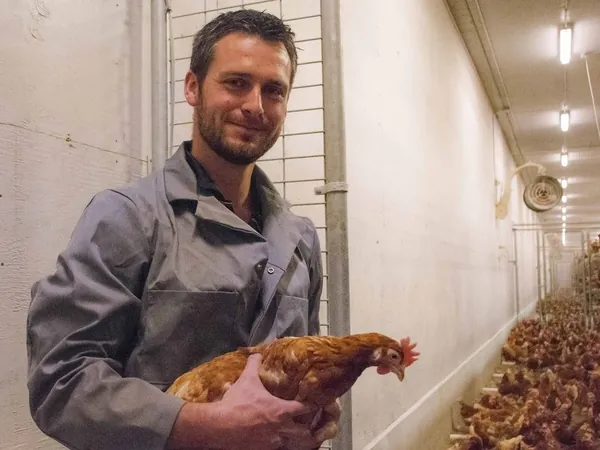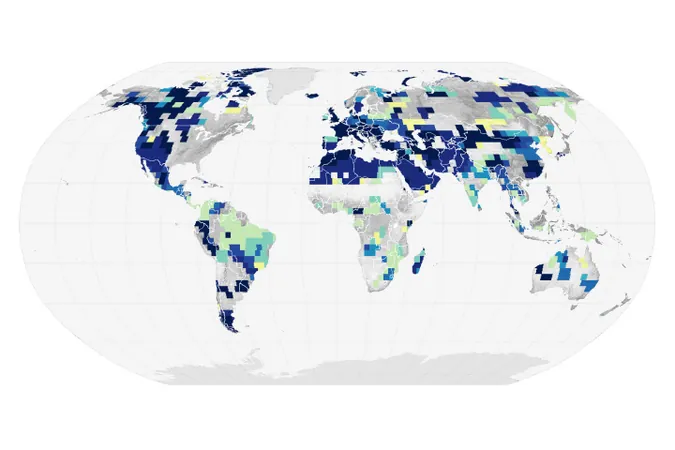
Tragic Loss: Abbotsford Egg Farm Dashes Hopes as Avian Flu Claims Entire Flock!
2024-11-08
Author: Benjamin
Introduction
In a heartbreaking turn of events, Siemens Farms in Abbotsford has been forced to slaughter its entire flock of approximately 45,000 hens and chicks due to a sudden outbreak of avian influenza. The highly pathogenic H5N1 strain has wreaked havoc across the Fraser Valley, impacting 15 farms over the past three weeks alone.
Owner's Emotional Toll
Owner Mark Siemens described the situation as 'devastating,' emphasizing the emotional toll on his family, who raised these birds with care. 'It’s hard on the whole family. You're with these birds every day and doing your best to take care of them. Seeing them all wiped out in such a short window of time was quite shocking and disheartening.'
Outbreak Timeline
The latest avian influenza outbreak began on November 1, when three farms in the Fraser Valley tested positive for the virus. Following the confirmed infections, the Canadian Food Inspection Agency (CFIA) ordered a humane culling of the affected flocks to prevent further spread of the virus.
Impact on Poultry Industry
This year’s outbreak has particularly affected the poultry industry, as mortality rates rise due to the disease, which is notoriously spread by migratory wild birds. Since its resurgence in 2022, over 11 million birds have been infected across Canada, with a staggering six million cases reported in British Columbia alone.
Swift Action and Diagnosis
After noticing some of his birds showing symptoms and discovering deceased birds in the barn, Siemens took swift action but was met with a devastating diagnosis. 'By the evening, most birds in the barn had very low energy. They weren’t eating or drinking much,' he recalled. 'Seeing the level of how unwell they were, it was really hard to watch.'
Details of the Loss
Among the 45,000 birds lost were 30,000 free-range egg-laying hens and 15,000 chicks. The biosecurity measures in place at Siemens Farms had previously shielded them from past outbreaks, but this incident served as a grim reminder of the relentless threat posed by avian influenza.
Industry Response
In response to the situation, the poultry industry in B.C. heightened its biosecurity protocols to the highest alert level—red—after cases were confirmed in neighboring states. Farmers are intensifying cleaning efforts for vehicles and limiting access to barns to curtail potential outbreaks. Nevertheless, despite these measures, the farms remain vulnerable during peak migration periods.
Recovery Process
While Siemens begins the process of compensation through the CFIA, he acknowledges that recovery will be a slow journey, likely taking one to two years. Fortunately, the structure of Canada’s supply management system is expected to mitigate immediate price fluctuations for eggs and poultry, offering some reassurance to consumers.
Community Support
As the Abbotsford community rallies behind affected farmers, Siemens urges support for local producers. 'Even though my eggs are no longer on the shelf, my neighbors are here to help, and by buying their eggs, you’re indirectly helping me and my family get through this challenging time,' he said.
Conclusion
As avian flu continues to pose a threat across the region, the impact on local agriculture and a sense of community resilience will be crucial in navigating this public health crisis.









 Brasil (PT)
Brasil (PT)
 Canada (EN)
Canada (EN)
 Chile (ES)
Chile (ES)
 España (ES)
España (ES)
 France (FR)
France (FR)
 Hong Kong (EN)
Hong Kong (EN)
 Italia (IT)
Italia (IT)
 日本 (JA)
日本 (JA)
 Magyarország (HU)
Magyarország (HU)
 Norge (NO)
Norge (NO)
 Polska (PL)
Polska (PL)
 Schweiz (DE)
Schweiz (DE)
 Singapore (EN)
Singapore (EN)
 Sverige (SV)
Sverige (SV)
 Suomi (FI)
Suomi (FI)
 Türkiye (TR)
Türkiye (TR)